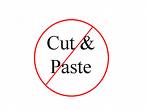Late last year, I discovered that someone had written and distributed a press release that used some of my work in it without giving me credit, a not-uncommon occurrence when a large body of one’s work appears online. The press release was picked up and published by at least 10 sites.
One hundred percent convinced of the righteousness of my quest, I pursued the issue with the offender and particularly the offender’s employer (because the offender passed me off to a supervisor without ever directly responding to me). I was met with nothing by arrogance and threats.
I debated long and hard about whether to pursue the issue, which stuck in my craw and made my blood boil whenever I thought about it. But given the other party’s arrogance, I concluded that pursuing the offense would only fill me with toxic feelings and not get resolved without legal intervention, and I didn’t feel hiring an attorney was worth it.
So, I decided to drop it. Then I read an interview with SMITH Magazine’s  Larry Smith on a site called The Rumpus. Regular readers know I’m a big fan of SMITH and its Six-Word Memoirs and have blogged about them multiple times.
Larry Smith on a site called The Rumpus. Regular readers know I’m a big fan of SMITH and its Six-Word Memoirs and have blogged about them multiple times.
Larry Smith’s situation was similar to mine. McGill University had used the six-word form to describe faculty and students without referencing the fact that SMITH was the inspiration for their six-word project. “… When someone essentially mirrors the exact ‘six-word memoir’ concept, we’d just like a nod — it’s the right thing to do,” Smith said. And that’s all I had asked for — either that the offender request that the sites that published the swiped material remove it or that they credit me for it.
What especially struck me about the situation was that my offender was also an academic. I could not avoid a feeling of disgust for the arrogance of academics who would never put up with this kind of theft of intellectual property from their students but who think nothing of practicing it themselves. It’s a little like Richard Nixon saying in Frost/Nixon that when the president breaks the law, it’s not illegal.
So, here’s the full story: The material in question was a set of unusual job-interview questions that appeared in an article I wrote on that subject a number of years ago. Some of the questions were standard oddball queries that most people have heard, such as “If you could have dinner with anyone from history, who would you choose?” Others, however, were questions I had crafted myself for use in mock interviews with my students.
The list of 15 questions credited to the offender appeared with the exact same wording and in the exact same order as in my article. A few other passages and phrases from my article were suspiciously similar.
I contacted the person, a staff member at a very large, well-known East Coast university, not in an accusing way, but more in the spirit of “let’s look at how this happened and see what can be done to fix it.”
I never once heard directly from this person. Instead, I heard from a dean, whose position was that interview questions are in the “public domain.” I can partially accept that position; after all, I would never presume to claim authorship for questions like “Why should I hire you?” or “What are your weaknesses?” But, again, these were unusual questions, some of which I had composed myself. And even if we accept that interview questions are in the public domain, why would this offender use the exact wording of my questions in the exact order? And how difficult would it be to simply indicate that the questions came from my article?
This dean went on to outrageously suggest that perhaps I had stolen the questions from the staff member and to threaten that if I contacted the outlets that ran the press release to ask them to credit the questions to me or remove the article, the school would take legal action against me.
Reading the interview with Larry Smith just reinforced the imperious attitude of academia. They can do no wrong but would never let their students get away with failing to credit a source.
In the Larry Smith case, however, the university did give in and credit SMITH for the six-word memoir concept — after a reporter wrote about it.
My approach here is to ventilate, get it out of my system, and see what my readers think. Obviously, I am sufficiently intimidated by these academic bullies that I am shielding the identity of the university, dean, and offender.
So what would you do? Forget it and move on? Engage an attorney? Pursue the issue on your own?
